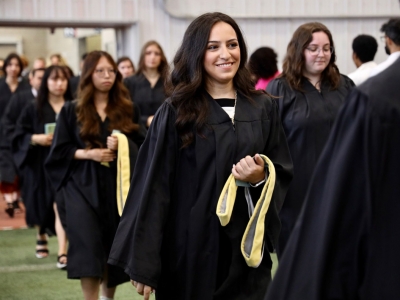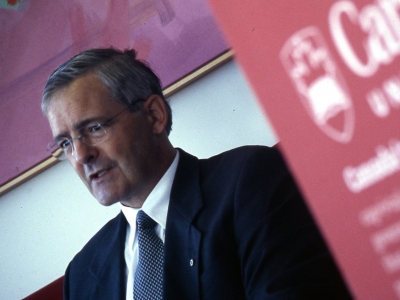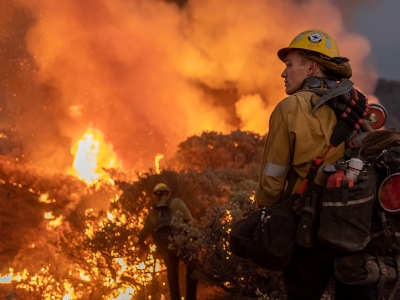French version to follow.
Carleton University’s David Carment, Canadian Global Affairs Institute (CGAI) Fellow, professor at the Norman Paterson School of International Affairs (NPSIA) and editor of the Canadian Foreign Policy Journal (CFPJ), along with guest editors, Stéphane Roussel of the École Nationale d’Administration and Greg Donaghy, head of the Historical Section, Global Affairs Canada, have released the newest issue of CFPJ, Canada and the Challenges of Globalization since 1968.
This issue brings together a handful of Canada’s foremost foreign policy and international relations experts and asks about the challenges posed by globalization over the last 50 years. How did Canadians and their policy-makers understand those challenges? And how well did Canada respond? The results are generally encouraging — Canada’s engagement with the globalized world since 1968 has been imperfect and improvised, but purposeful.
“Far from being swept along in a reactionary process beyond its control,” said Donaghy, “Canada often responded to the pressures of globalization in a liberal, measured and interest-based manner.”
Contributors to this issue include Adam Chapnick, who discusses Canada’s UN Security Council record in an era of reform, as well as political scientists Sara Greco and Stéfanie von Hlatky, on Canadian burden-sharing in NATO. Roussel, Justin Massie and Jonathan Paquin review Canadian white papers on foreign affairs and defence since the 1960s, capturing the official view of the changing global security context.
Several contributors underline globalization’s social dimensions. Peter Stoett explores the contradictory pressures shaping Canada’s response to global environmentalism and Laura Macdonald demonstrates how globalization encourages transnational linkages that promote civil engagement in foreign policy decision-making. Historians David Webster and Laura Madokoro explore Canada’s challenges regarding global migration and engaging the global south. Alberta trade expert Chris Kukucha offers a grim reckoning of Canadian foreign trade policy over the past quarter century.
Looking forward, former diplomats Lucie Edwards and Daryl Copeland, use the past to offer compelling lessons for the future of Canada in the world.
Readers can download one CFPJ article free of charge on the journal’s affiliate website http://iaffairscanada.com
CFPJ is published by NPSIA at Carleton and is now in its 26th year of publication.
Click here to read the new issue.
Media Contact
Steven Reid
Media Relations Officer
Carleton University
613-520-2600, ext. 8718
613-265-6613
Steven_Reid3@Carleton.ca
Carleton Flipboard account: https://flipboard.com/@carletonstories/carleton-stories-0gbu905my
Follow us on Twitter: www.twitter.com/Cunewsroom
Need an expert? Go to: www.carleton.ca/newsroom/experts
La Politique étrangère canadienne se penche sur la réaction du Canada face à la mondialisation au cours des cinquante dernières années
David Carment, Fellow à l’Institut canadien des affaires mondiales (CGAI), professeur à la Norman Paterson School of International Affairs (NPSIA) et rédacteur en chef de la revue La politique étrangère canadienne, vient de publier, en collaboration avec Greg Donaghy, chef de la Section des affaires historiques à Affaires mondiales Canada, et de Stéphane Roussel, professeur à l’École nationale d’administration publique (ENAP), le plus récent numéro de la collection, sous le titre Le Canada face aux enjeux de la mondialisation depuis 1968.
Dans cette publication, quelques-uns des plus éminents chercheurs en relations internationales et en politique étrangère sont appelés à se prononcer sur une série de questions : Quels ont été les principaux défis par la mondialisation au cours des cinquante dernières années? Comment les Canadiens et leurs dirigeants politiques ont-ils perçu ces changements? Comment ont-ils tenté de s’y adapter et avec quel succès? Somme toute, les conclusions se révèlent plutôt encourageantes, puisque si la réaction canadienne a été parfois imparfaite et improvisée, elle fut aussi réfléchie.
Ainsi, Adam Chapnick s’intéresse à la feuille de route canadienne face aux tentatives de réforme du Conseil de Sécurité des Nations Unies; Sara Greco et Stéfanie Von Hlatky évaluent la contribution du Canada au « partage du fardeau » au sein de l’OTAN; Stéphane Roussel, Justin Massie et Jonathan Paquin font un survol des livres blancs sur la politique étrangère et la défense publiés depuis les années 1960 pour saisir la perception du gouvernement d’un environnement de sécurité mondial en évolution.
Plusieurs contributions portent sur les dimensions sociales de la mondialisation. Ainsi, Peter Stoett explore les pressions contradictoires qui structurent la réaction du Canada à l’émergence des préoccupations environnementales. Laura Macdonald démontre comment la mondialisation a favorisé des liens transnationaux qui incitent la société civile à participer à la prise de décision en politique étrangère. David Webster et Laura Madokoro cernent les défis que posent au Canada les mouvements migratoires et le dialogue avec les sociétés du Sud. Enfin, Chris Kukucha trace un portait plutôt sombre de la politique commerciale canadienne du dernier quart de siècle.
Deux anciens diplomates, Lucie Edwards et Daryl Copeland, se servent de ce matériel pour dégager des leçons pouvant guider la marche du Canada dans le monde.
Le lecteur peut télécharger gratuitement l’un des articles sur le site affilié de la revue : http://iaffairscanada.com
La Politique étrangère canadienne, publiée par la NPSIA, en est à sa 26e année.
Cliquer ici pour prendre connaissance du nouveau numéro :
https://www.tandfonline.com/toc/rcfp20/current
Contact avec les médias :
Steven Reid
Media Relations Officer
Carleton University
613-520-2600, ext. 8718
613-265-6613
Steven_Reid3@Carleton.ca
Carleton Flipboard account: https://flipboard.com/@carletonstories/carleton-stories-0gbu905my
Follow us on Twitter: www.twitter.com/Cunewsroom
Need an expert? Go to: www.carleton.ca/newsroom/experts
Tuesday, November 6, 2018 in News Releases
Share: Twitter, Facebook



